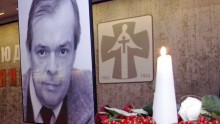Ukraine will shortly mark the Holodomor Memorial Day. For eight years running, this truly existential date has also been marked by Den’s James Mace Civic Stand Prize award ceremony (this award was instituted by Editor-in-Chief Larysa Ivshyna, to be conferred in recognition of outstanding merits in the sphere of journalism, assertion of national historical memory, national identity, and recognition of the 1932-33 Holodomor as an act of genocide against Ukrainians).
Previous James Mace Prize winners include Den/The Day’s journalists and contributors Ihor LOSIEV (2009), Ihor SIUNDIUKOV (2010), Serhii HRABOVSKYI (2011), Oleksandr PALII (2012), Petro KRALIUK and Volodymyr BOIKO (2013), Valentyn TORBA (2014), and Ivan KAPSAMUN (2015).
Stanislav KULCHYTSKYI, Ph.D. (History), member of the Civic James Mace Award Council, says Den/The Day ranks with Ukraine’s “most prestigious periodicals. It is respected by those on the upper echelons of power. All James Mace Prize winners are either regular (almost weekly) contributors or staff journalists. Their creative endeavors keep the reading public interested in this periodical. Naturally, this award focuses on history, including the Holodomor, as well as on what Dr. James Mace described as a ‘postgenocidal society’ in his regular front page comments. Postgenocidal society is our daily reality. This newspaper helps us understand the trends in our development and the current status of Ukraine. Quite a few noted economists and experts in the humanities respect this periodical and now and then contribute their articles that are of interest to Ukrainian society. I feel sure that this award should be conferred on journalists and scholars who combine scientific studies with journalism. I’m especially impressed by the contributions of Ihor Siundiukov in the ‘History and I’ and ‘Ukraine Incognita’ columns. I have known him since he joined the editorial staff. He has shown quite some progress since then. He started by writing popular science feature and now he contributes topical analytical articles.”
In one of his recent contributions, “How Terror by Famine Acted and Why,” Dr. Kulchytskyi broaches a number of issues, specifically the fact that myths are still being generated, concerning Holodomor: “2018 will mark the 85th Holodomor anniversary… I am convinced that Ukraine must once again turn to the UN General Assembly for recognizing the Holodomor as an act of genocide, and that we will then stand a better chance [of receiving this recognition] than 10 years ago. However, those currently in power in Ukraine are not taking any steps in that direction. They are busy coping with the complicated domestic situation. To an extent, this situation is caused by Ukraine remaining a postgenocidal society. I believe that in the next two years we’ll have to step up the popularization of our research at home, not our research (it has long been carried out). The resolution of the Verkhovna Rada and the court ruling aren’t enough. The Holodomor must be recognized by the United Nations.”
Events over the couple of past years have shown that failing to learn from the lessons of history can have grave consequences. “Far from all in the east of Ukraine, where the 1932-33 Holodomor raged about as much as it did in the central and southern parts of this country, have treated this event seriously enough,” says 2014 James Mace Prize winner Valentyn Torba. “They agree that some bad events took place, that people died, but people also died in the Volga Region, and millions died during the [Great Patriotic] War of 1941-45, they add… That’s how Soviet propaganda and censored historical studies have erased all memories about the Holodomor and, most importantly, about its roots and causes. People have been born and grown up without a sense of danger, and this has finally played its evil part. Many say that their native Donbas identifies itself with Russia; that was why the door was thrown open wide for the [Russian] occupier. In fact, the trouble is that Donbas has for the most part failed to identify itself and this has served as fertile soil for a broad range of information manipulations. Before the occupier seized that part of Ukrainian territory, he had destroyed our [national historical] memory. The war is going on, with Ukrainians having their arms with a tryzub tattoo chopped off and thrown behind bars for displaying the national colors. Unless we do all we can to bring whole Ukrainian social strata back to consciousness, we will live through another postgenocidal, postwar phase. But in 50 years from now, there may emerge no other Dr. James Mace prepared to do our job for us. After all, the James Mace Prize, initiated by Editor-in-Chief Larysa Ivshyna, is meant to stress the importance of one’s civic stand in preserving this memory and exposing the true reasons behind that tragedy.”
This year’s James Mace Prize winner’s name will be announced on November 24. You can be the first to see it in Den/The Day and on our website.
ISES – with support from the Institute for Social and Economic Studies








